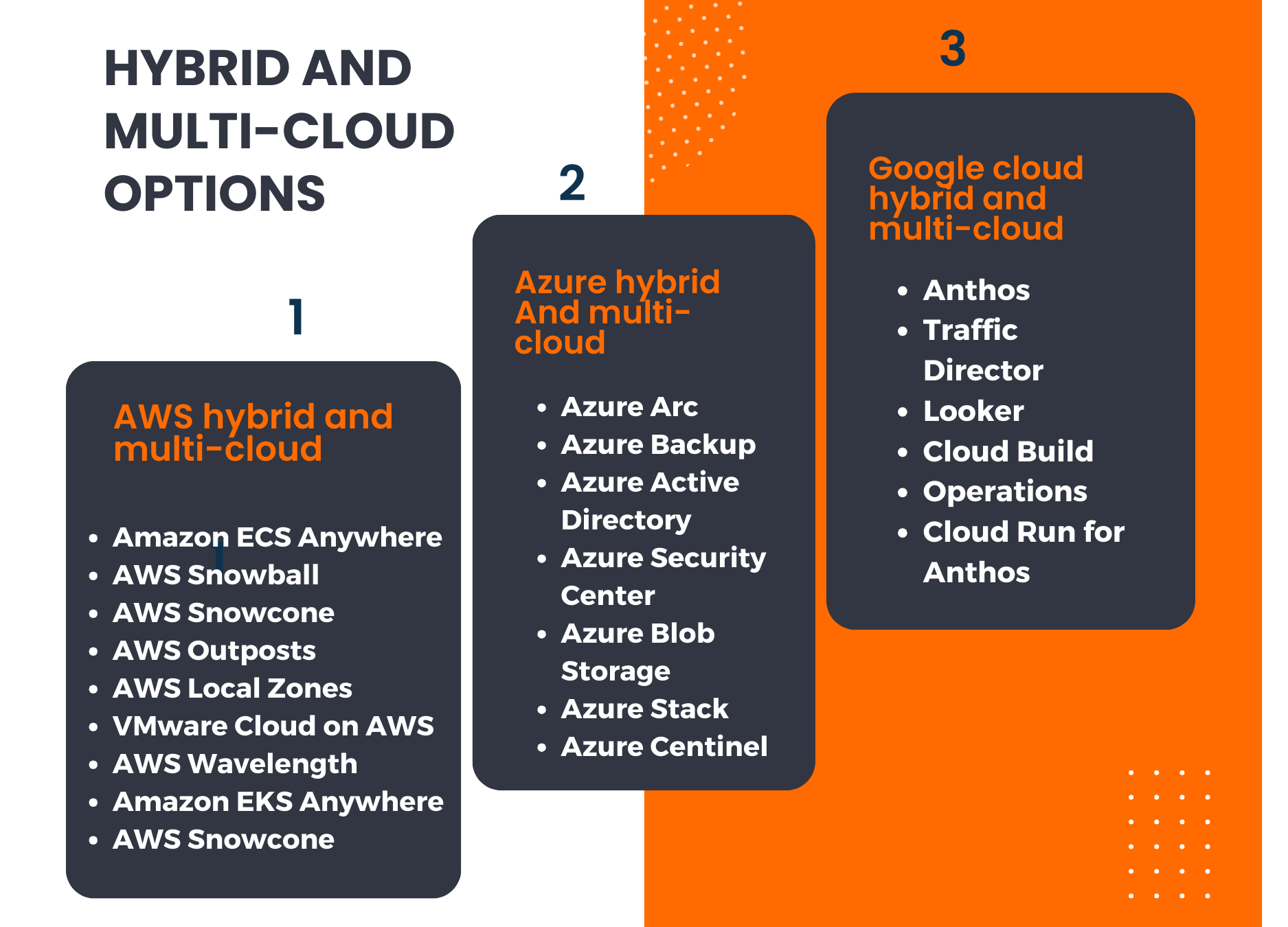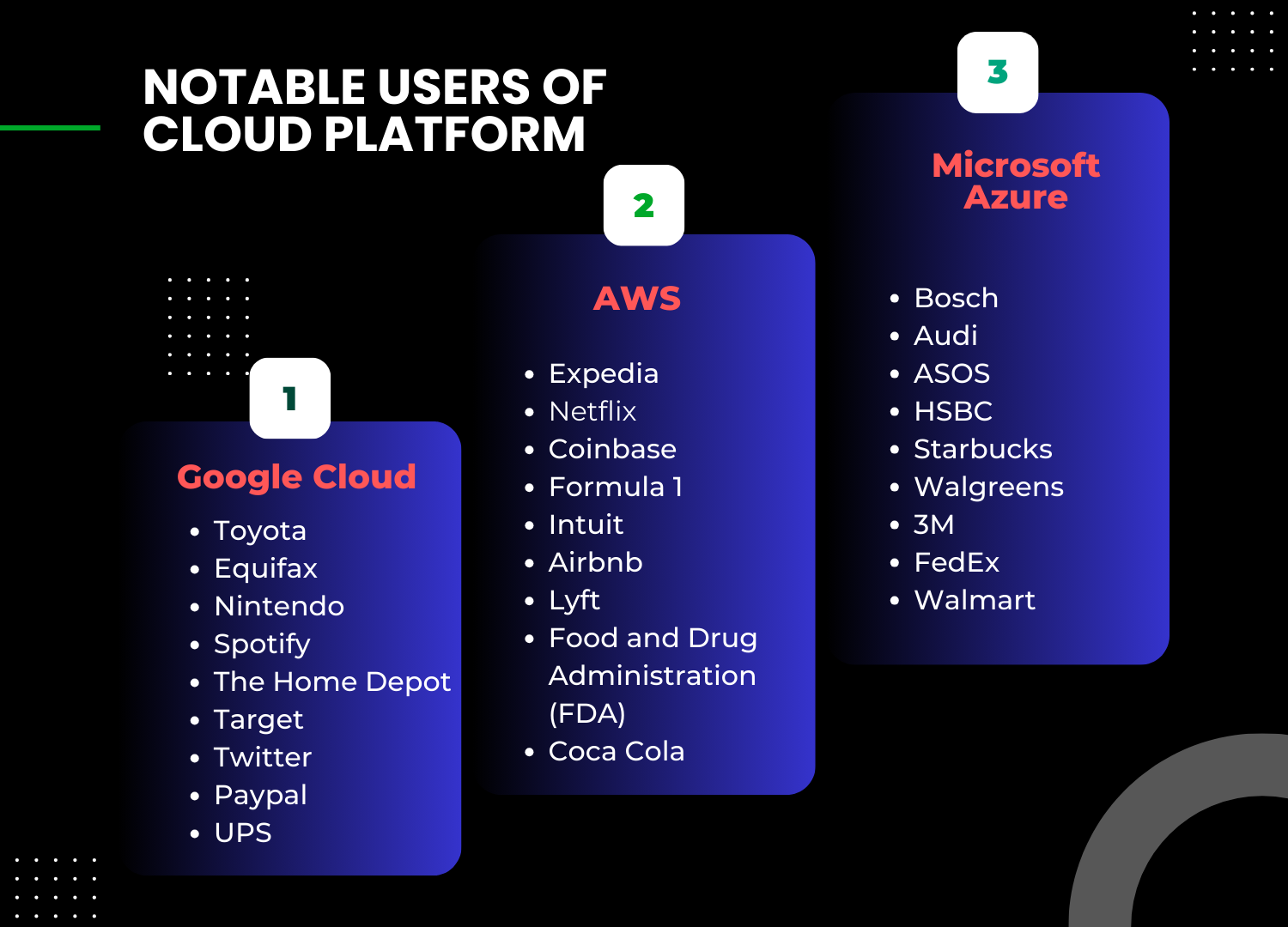Table of Contents
The traditional approach to app hosting was quite costly and time-consuming. To operate, they needed a significant amount of complex hardware and software resources. It would also take a team of specialists to install, set up, test, run, secure, and maintain them. Cloud computing is the on-demand provision of computer resources, such as CPU and memory-rich servers. There are two forms of storage: object storage and block storage. Virtual networks, subnetworks, connections to the physical space, and structured, unstructured, and semi-structured data are all found in databases. When using the cloud, you just pay for what you use, much like with your energy or water account. The market for cloud computing is expected to develop further and reach $2432.87 billion by 2030. In this massive market, three cloud providers—Amazon Web Services (AWS), Google Cloud Platform (GCP), and Microsoft Azure—combined own 65% of the market share. Various users who are looking to choose a cloud provider to host their website or application will go with one of these large-scale providers.
Despite their first similarities, these three providers each have distinct advantages and disadvantages that can significantly affect your cloud expenses, usability, and overall experience. We’ll discuss the main distinctions between Amazon, GCP, and Microsoft Azure in this post and assist you in selecting the option that best meets your company’s requirements.
Cloud computing has also proven essential in commercial environments, ranging from small startups to large multinational organizations. Apart from offering the enormous processing power and additional resources needed to benefit from innovative technologies like quantum computing and generative AI, its many business uses also include facilitating remote work by making data and apps accessible from any location and laying the groundwork for flawless omnichannel customer interaction.
Explore The Power of Cloud. Launch Your Cloud Journey Now!
The Three Major Cloud Platforms: Features and Benefits
Microsoft Azure, Google Cloud Platform, and AWS platform are the three largest cloud providers in this market. Top-notch cloud computing services including networking, computing, and storage are provided by them to industries throughout the world.
Large-scale cloud service providers AWS, Azure, and GCP are very popular. There are benefits unique to each of them. While Azure is superior at interacting with other services and offering better security, the AWS platform is well-known for its wide global reach and scalability choices. However, GCP is unique in that it offers machine learning and sophisticated data management.
AWS, or Amazon Web Services
The most extensive and widely used cloud platform in the world is Amazon Web Services (AWS). It offers paid subscription-based on-demand cloud computing services to the most well-known businesses employing the extensive range of services offered by the AWS platform. such as LinkedIn, Facebook, Spotify, Netflix, and the BBC. For instance, by renting a server on AWS, you may connect to, set up, secure, and run it just like a real server. Because it runs on an AWS-managed planet-scale network, the virtual server is unique.
With millions of active users and dozens of partners worldwide, AWS offers the largest community. By shifting their IT management to AWS, the majority of businesses use the platform to grow their operations. Among AWS’s key characteristics are increased performance, security, scalability, and flexibility.
Benefits of AWS
- Users of the AWS platform can pay for just the resources they utilize. Thus, AWS is economical.
- AWS offers a variety of Amazon cloud services and has a sizable and vibrant developer and partner community.
- Users may access or store data with minimal latency because of AWS’s numerous data centers throughout the world.
Microsoft Azure
Windows Azure is another name for Microsoft Azure services. It is a global cloud platform for creating, implementing, and overseeing services. Numerous programming languages, including Java, Node.js, C, and C#are supported. The benefit of utilizing Microsoft Azure cloud services is that it enables us to access a vast array of services without the need to plan and buy extra gear.
Through the Internet, Microsoft Azure Cloud offers a variety of computing services, including servers, storage, databases, software, networking, and analytics.
Benefits of Azure services
- Because Azure has a global network of data centers, accessing any data has extremely little latency.
- Azure services have robust security.
- Azure makes it simple to integrate with on-premises systems, enabling a smooth hybrid experience where security and deployment are superior.
Platform Google Cloud (GCP)
Since its launch in 2008 in the name of Google Cloud this platform has been used by the majority of businesses to create, develop, and launch cloud apps with ease. It enables us to use a high-speed internet connection to access these applications. One benefit of Google cloud computing services is its support for several databases, including SQL, MYSQL, Oracle, Sam, and others. Cloud computing services such as computation, data analytics, data storage, and machine learning are offered by Google Cloud Platform (GCP).
Benefits of GCP
- Google cloud computing makes resource scaling simple. To give an example, we can quickly build virtual machines if our company needs extra servers.
- Due to GCP’s extensive worldwide network of data centers, accessing any data has extremely little latency.
- GCP offers robust security.

Azure vs. AWS vs. Google Cloud: Navigating the Cloud Maze
There are certain differences between the cloud platforms offered by AWS, Microsoft Azure, and Google Cloud platform services, even if they all offer a variety of cutting-edge features for processing, storage, management, and other services. Let’s examine some of the most significant distinctions among the top three cloud computing platforms.
| Parameter | AWS | Azure | Google Cloud Platform |
|---|---|---|---|
| App Testing | Device Farm | DevTest Labs | Cloud Test Labs |
| API Management | Amazon API Gateway | Azure API Gateway | Cloud Endpoints |
| Kubernetes Management | Amazon EKS | Azure Kubernetes Service (AKS) | Google Kubernetes Engine (GKE) |
| Git Repositories | AWS CodeCommit | Azure Repos | Cloud Source Repositories |
| Data Warehouse | Amazon Redshift | Azure SQL Data Warehouse | Google BigQuery |
| Object Storage | Amazon S3 | Azure Blob Storage | Google Cloud Storage |
| Relational DB | Amazon RDS | Azure SQL Database | Google Cloud SQL |
| Google Cloud SQL | Amazon EBS | Azure Managed Disks | Google Persistent Disks |
| Marketplace | AWS Marketplace | Azure Marketplace | Google Cloud Marketplace |
| File Storage | Amazon EFS | Azure Files | Google Cloud Filestore |
| Media Services | Amazon Elastic Transcoder | Azure Media Services | Google Cloud Video Intelligence API |
| Virtual Network | Amazon VPC | Azure Virtual Network (VNet) | Google VPC Network |
| Pricing | Per Hour | Per Minute | Per Minute |
| Maximum Processors in VM | 128 | 128 | 96 |
| Maximum Memory in VM (GiB) | 3904 | 3800 | 1433 |
| Caching | Amazon ElastiCache | Azure Redis Cache | Google Cloud CDN |
| Load Balancing Configuration | Elastic Load Balancing | Azure Load Balancer | Google Cloud Load Balancing |
| Global Content Delivery Networks | Amazon CloudFront | Azure Content Delivery Network | Google Cloud Interconnect |
Which Cloud Platform To Use?
Comparable computer resources, such as virtual machines and serverless computing choices, are offered by AWS, Azure, and GCP. However, since every cloud provider has distinct features and services to suit various use cases, organizations can select the platform that best suits their needs and preferences for computing. AWS, Azure, or GCP may be used in conjunction with another more affordable cloud service, or many firms may choose a multi-cloud solution, which combines more than one of the three cloud providers.
Product Offerings-
Amazon Web Services, or AWS Products
- Amazon EC2 (Elastic Compute Cloud), which delivers a scalable virtual private cloud for a variety of use cases, is just one of the many computing resources offered by AWS consulting.
- EC2 offers a range of instance kinds, including general-purpose, memory-intensive, and GPU-powered instances, each tailored for a particular application.
- With AWS Lambda, the company also provides serverless computing, allowing programmers to run code without the need to provision or manage servers.
Microsoft Azure, or Azure Products
- Azure provides scalable and adaptable virtualized computing environments through its Virtual Machines (VMs) service, which provides comparable computational power.
- Azure Virtual Machines provide memory, computation, and storage-optimized instances in a range of instance sizes to meet diverse workload requirements.
- Azure consultants also offer serverless computing through Azure Functions, which frees developers from worrying about the underlying infrastructure while executing event-driven functions.
Google Cloud Platform, or GCP Products
- Google Compute Engine provides VM instances that can be customized, and GCP’s processing resources are accessible through it.
- Users can carefully tailor machine types and existing machine types with Google Compute Engine to meet their specific requirements.
- With Google Cloud Functions, developers can run event-driven functions without worrying about server management thanks to serverless computing, which is made possible by Google Cloud Platform.
Data Centers-
The infrastructure of AWS, Azure, and Google Cloud consultancy centers is another important distinction. Businesses and developers looking for the best cloud solution for them must understand the geographical distribution and performance capabilities of their data centers because the location of an application’s or website’s users will determine the data center requirements. Here are some further details regarding the comparison of the quantity and locations of AWS, GCP, and Azure data centers:
Amazon Web Services, or AWS Data centers
- Over 200 data centers are dispersed throughout several continents, including North America, Europe, Asia, Australia, and South America, and are managed by AWS consulting.
- Businesses may lower latency and boost speed by locating resources closer to end users thanks to AWS’s vast data center infrastructure.
Microsoft Azure, or Azure Data Centers
- Microsoft has a significant presence in North America, Europe, Asia, and Australia, and it is constantly growing its data center footprint.
- Microsoft’s vast network backbone is connected with Azure’s data centers, guaranteeing low latency and fast data transfer.
Google Cloud Platform, or GCP Data Centers
- GCP Data centers are strategically located throughout North America, Europe, Asia, Australia, and South America..
- Though GCP has fewer data centers than AWS and Azure, its high-performance global network architecture is well-known.
- GCP is recommended for apps that need low latency and fast data transfer because of Google’s expertise in network optimization.
Data centers can be helpful when you are comparing AWS, Azure, and GCP. When you select a cloud service provider, businesses need to take into account the geographic location of the preferred cloud service provider and their data centers to guarantee optimal performance and data accessibility for their intended audience.
Pricing –
Cost is one of the most crucial factors to take into account when selecting a cloud service provider. It’s also crucial to be aware that pay-per-minute billing has recently been offered by AWS. Users can save significantly more money using Google Cloud‘s pay-per-second payment options than with AWS or Azure. Azure has pay-per-minute charging available already. Google also offers a range of discounts in comparison to AWS, which may enable users to save as much as 50%.
According to Gartner, “Google offers huge discounts and very flexible contracts to try to win projects from clients.”
Amazon Web Services, or AWS pricing
- Pay-as-you-go with flexibility and cost control is provided by AWS.
- provides a range of instance types at varying price points according to capacity and performance.
- For services like Amazon S3 and Amazon EBS, storage charges are determined by capacity and access patterns.
- While egress (data transmitted) varies depending on volume and region, it normally costs between $0.05 and $0.09 per GB across a range of network interfaces and price plans. Ingress (data received) is usually free.
- Discounts for upfront payments offered by AWS Savings Plans and Reserved Instances.
Azure, or Windows Azure Pricing
- Offers Reserved VM Instances for a discounted price and uses a pay-as-you-go basis.
- Instance families with varying workload optimizations.
- Azure Blob Storage and Azure Disk Storage have storage fees that vary depending on capacity and usage.
- Allows free entry most of the time; egress fees are charged based on area and data amount.
- Customers with active licenses can receive volume discounts through Azure Hybrid Benefit.
Google Cloud Platform (GCP) Pricing
- Pay-as-you-go system featuring both standard and customized machine types.
- Google Cloud Storage and Google Persistent Disk storage fees are determined by capacity and frequency of usage.
- Depending on how much data is delivered and received, data transfer costs change.
- Committed Use Contracts offering upfront commitments for one or three years can provide discounts.
- There are three available support tiers: Basic, Development, and Production. The response times and coverage of each tier vary.
Due to their different approaches to pay-as-you-go models, instance kinds, storage, data transfer charges, and discounts, AWS, Azure, and GCP have different prices.
Depending on the business the requirements can vary and every cloud service provider has a different way of meeting those needs. For instance, how software developers, financial institutions, and e-commerce businesses employ cloud services vary.
They have specific requirements regarding regulatory compliance. Although cloud consulting companies sometimes carve out a specialty that works well for potential customers, they may nevertheless offer comparable services to other businesses. You may have an edge if you know how AWS, Azure, and GCP fit into the bigger cloud strategy goals of your company.

Use Cases of AWS, Azure, and Google Cloud
Although all three hyperscalers—AWS, Azure, and GCP—offer robust cloud services, each is tailored to particular use cases. With its extensive service offering and worldwide reach, AWS is perfect for a range of applications. Azure is a great option for businesses because of its robust security features and smooth connectivity with the Microsoft ecosystem. GCP is appealing to data-driven and containerized applications because of its proficiency with Kubernetes, high-performance networking, and data analytics. Further details on the use cases that each of these cloud providers supports are provided below:
AWS Use Cases
1. Netflix
Netflix is an American entertainment platform that subsequently spread to many other nations and gained a lot of popularity. However, after the unexpected spike in viewers, Netflix had to face the issue of scalability. Netflix chose AWS cloud services as a result of this. Netflix claims that it was able to manage the data when it began utilizing AWS technologies like Cassandra and DynamoDB for its distributed databases. Scalability, then, is one of AWS’s main advantages. Approximately 100,000 AWS server instances have been customized by Netflix for use in analytics, recommendation engines, computation and storage databases, and video transcoding.
2. McDonald’s
The largest fast-food chain in the world, McDonald’s feeds almost 64 million customers every day. When this company began offering residential delivery, its growth reached a new height. McDonald’s developed a platform that links neighborhood eateries with delivery services like Uber Eats by leveraging when they hire cloud consultants for AWS services. Scalability is an additional factor in the company’s decision to go with a cloud consulting company. Additionally, the McDonald’s platform can handle 20,000 orders per second and interface with international partners with ease thanks to AWS Microservices Architecture.
3. Airbnb
Airbnb is a global internet rental house marketplace. This platform links homeowners willing to rent out their properties with renters seeking lodging. The continuous flow of data from users onto the platform quickly overwhelmed Airbnb. At that point, Elastic Load Balancing, which divides incoming traffic among several Amazon EC2 instances, and the Amazon EC2 cloud platforms service were used. Customers could continue to utilize the online platform without any interruptions, and Airbnb could avoid traffic.
Azure use cases
IHG (Intercontinental Hotel Group)
Modern software is used by the Intercontinental Hotel Group (IHG) to provide its customers with the greatest experience possible. It has also long utilized Azure consulting. The business now uses several tools that need Agile processes.
The company, an international hotel chain, handles a lot of data every day. IHG uses Azure StorSimple, the cloud platform’s hybrid cloud storage solution for businesses, to expedite this procedure.
It helps the company to streamline the entire data management process and save up to 70% on data storage costs. Furthermore, the business may readily backup its data, reducing the danger of data loss.
AkzoNobel
The international paint business AkzoNobel is based in the Netherlands. It requires excellent 24/7 connectivity because it provides services in more than 100 countries. As a result, it makes use of Azure IoT services and cloud security consulting to improve connection and security and grow its company.
University of Toronto
The biggest university in Canada is the University of Toronto. Additionally, it is a pioneer in the field of worldwide research. Consequently, the university has moved some of its operations to the Azure cloud to reduce the expense of hardware replacement and improve security through cloud security practices. Additionally, the institution can modify its IT procedures as a result, saving a substantial amount of time.
Reduce Your IT Costs and Migrate Your Workload to Cloud Today
Google Cloud Use cases
Home Depot
Google and The Home Depot collaborated to employ Google’s cutting-edge cloud computing technology. Today, the Customer Asset Repository, General Ledgers, and Business Objects of The Home Depot’s new SAP system are powered by Google cloud security services. Supply chain analytics and report generation are made possible by the Home Depot’s use of Google’s big data analysis technologies, including BigQuery. Thus, it forecasts supplier lead times that affect their product release forecasts.
To help the business stay up to date with technology improvements and give customers better shopping experiences by merging physical and computerized situations, they have extended their multiyear cloud collaboration.
Etsy
A well-known online store Etsy just finished a two-year transition to Google Cloud from 2,000 on-premises servers. In keeping with the growing trend of big brands embracing cloud computing, Etsy has been spending money on Google cloud infrastructure software to develop its primary website and mobile application. The platform of the Brooklyn-based company hosts more than 34 million unique product listings from over two million sellers, ranging from small-time artisans selling their handcrafted goods to major corporations using Etsy as a supplemental source of revenue.
The engineers and data scientists at Etsy improved their capacity for experimenting with the aid of AI and other machine learning technologies. Etsy’s carbon footprint was drastically reduced after switching to Google Cloud security services, which resulted in 60% annual savings on infrastructure and processing power. Through this environmentally friendly strategy, Etsy was able to improve resource predictability coming forward and optimize computer costs by 42%. With these upgrades, Etsy is advancing its green business philosophy as the international marketplace keeps putting out the effort to enhance the community that it serves.
Paypal
PayPal’s approach includes developing a useful infrastructure that can manage different kinds of traffic. Instead of preparing ahead of time, they will be able to create expectations based on demand as needed. One of PayPal’s most important cost-saving measures since the company went to the cloud is this. To have adequate hardware on hand for sporadic times of high traffic around the holidays, they had to equip their servers with capacity before making the shift. Currently, PayPal is powered by Google Cloud, which enables them to instantly access servers in case they run out of hardware or require more speed during periods of high traffic.
Choose A3Logics as Your Cloud Service provider
A3Logics is a leading cloud computing company with expertise in custom software development services. We provide organizations with cloud services that can harness the power of the cloud to increase business potential and maximize value. Whether it is cloud migration, secure cloud-native solutions, or future-ready scalable solutions our experts can deliver it with precision.
Accelerate the expansion of your company with A3Logics’ precisely designed, specialized cloud computing solutions. We offer end-to-end cloud consulting services that ensure scalability, flexibility, and unrivaled performance, from smooth migration and architecture design to deployment and continuous optimization.
At A3Logics, we take great satisfaction in our customer-centric strategy, placing a high value on dialogue, teamwork, and openness at every turn. Innovation is more than just a catchphrase when working with us as your reliable technology partner; it’s the engine that powers every solution we provide.
Conclusion
In today’s contest between Azure, AWS, and Google Cloud, AWS easily emerges as the clear winner as a cloud computing company, with a bigger market share of 31%, while Azure comes in close at 24%. It’s difficult to predict, though, how long AWS will hold the top spot in the cloud provider rankings considering that GCP and Azure are gaining ground on AWS.
Azure and GCP each have their advantages, but AWS also benefits from being the pioneer in this regard. Since it’s simple to integrate Microsoft tools with Azure cloud, many firms that utilize MS technologies find that using Azure cloud makes more sense. Well-known hyperscale cloud consulting services, AWS, Azure, and GCP each have their own advantages.
AWS is known for its worldwide reach and scalability, Azure for its excellent integration and security, and GCP for its superior machine learning and data management. The key to selecting the best supplier is being aware of particular requirements, such as price and performance.
Unlock The Path to Innovation With Our AWS, Azure and GCP Cloud Solutions
FAQ
Which cloud provider—Google Cloud, Microsoft Azure, or Amazon Web Services—is better?
In the market for cloud computing services, Amazon Web Services continues to be the most well-liked vendor, with a market share of about 33%.
How does GCP measure up against Azure and AWS?
AWS is a well-known industry leader. Systems using Hybrid Clouds can access Azure. Big data and machine learning are two areas of expertise for GCP’s high-end computing capabilities. High Stability of Transfer: minimal data loss when transferring between servers and storage
What is a cloud platform?
Cloud platforms facilitate the development, testing, and building of cloud-native applications, as well as the storing, backing up, and recovering of data for enterprises. Enterprise solutions include streaming audio and video, integrating data into workflows, and providing software as needed. It also allows them to look at data.
Who is the biggest competitor of AWS?
For an IT department whose primary responsibility is to maintain critical IT services like AD, DNS, and certain Apps, Microsoft Azure is a competitor to AWS. Integrating it with existing resources such as Office 365, Teams, SharePoint, Windows 10 PCs, and .NET Apps is easy.
Which additional cloud platforms are there?
There are a few options to think about if your present budget or scale prevents you from moving fully to a big cloud platform just now. For your company’s first cloud conversion, smaller-scale possibilities include Tencent Cloud, IBM, Alibaba Cloud, Oracle, and others.
For instance, Oracle Cloud Infrastructure (OCI) is a strong competitor for businesses with on-premises systems looking to shift servers to the cloud and establish a safe remote workplace that employees can access from any location.






